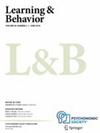Ants find shortest paths using simple, local rules.
IF 1.5
4区 心理学
Q3 BEHAVIORAL SCIENCES
引用次数: 0
Abstract
Garg et al. (2023, Proceedings of the National Academy of Sciences, 120[6], e2207959120) build simulation models to understand how turtle ants collectively find efficient paths through branched networks, highlighting the importance of bidirectional traffic, leakage of ants at junctions, and the ability to increase flow as key components for efficiency. Their findings provide new, biologically realistic mechanisms that could improve applications in our own engineered networks.
蚂蚁利用简单的局部规则寻找最短路径。
Garg等人(2023年,《美国国家科学院院刊》,120[6], e2207959120)建立了仿真模型,以了解龟蚁如何通过分支网络集体找到高效路径,强调了双向交通、蚂蚁在交界处的泄漏以及增加流量的能力作为提高效率的关键因素的重要性。他们的发现提供了新的、符合生物现实的机制,可以改善我们自己的工程网络的应用。
本文章由计算机程序翻译,如有差异,请以英文原文为准。
求助全文
约1分钟内获得全文
求助全文
来源期刊

Learning & Behavior
医学-动物学
CiteScore
2.90
自引率
5.60%
发文量
50
审稿时长
>12 weeks
期刊介绍:
Learning & Behavior publishes experimental and theoretical contributions and critical reviews concerning fundamental processes of learning and behavior in nonhuman and human animals. Topics covered include sensation, perception, conditioning, learning, attention, memory, motivation, emotion, development, social behavior, and comparative investigations.
 求助内容:
求助内容: 应助结果提醒方式:
应助结果提醒方式:


